- Home
- H. P. Lovecraft
H. P. Lovecraft Page 15
H. P. Lovecraft Read online
Page 15
At 11 a.m. the next day I commenced digging. It was sunny weather, and I was glad of that. I was still alone, for as much as I feared the unknown horror I sought, there was more fear in the thought of telling anybody. Later I told Harris only through sheer necessity, and because he had heard odd tales from old people which disposed him ever so little toward belief. As I turned up the stinking black earth in front of the fireplace, my spade causing a viscous yellow ichor to ooze from the white fungi which it severed, I trembled at the dubious thoughts of what I might uncover. Some secrets of inner earth are not good for mankind, and this seemed to me one of them.
My hand shook perceptibly, but still I delved; after a while standing in the large hole I had made. With the deepening of the hole, which was about six feet square, the evil smell increased; and I lost all doubt of my imminent contact with the hellish thing whose emanations had cursed the house for over a century and a half. I wondered what it would look like—what its form and substance would be, and how big it might have waxed through long ages of life-sucking. At length I climbed out of the hole and dispersed the heaped-up dirt, then arranging the great carboys of acid around and near two sides, so that when necessary I might empty them all down the aperture in quick succession. After that I dumped earth only along the other two sides; working more slowly and donning my gas-mask as the smell grew. I was nearly unnerved at my proximity to a nameless thing at the bottom of a pit.
Suddenly my spade struck something softer than earth. I shuddered, and made a motion as if to climb out of the hole, which was now as deep as my neck. Then courage returned, and I scraped away more dirt in the light of the electric torch I had provided. The surface I uncovered was fishy and glassy—a kind of semi-putrid congealed jelly with suggestions of translucency. I scraped further, and saw that it had form. There was a rift where a part of the substance was folded over. The exposed area was huge and roughly cylindrical; like a mammoth soft blue-white stovepipe doubled in two, its largest part some two feet in diameter. Still more I scraped, and then abruptly I leaped out of the hole and away from the filthy thing; frantically unstopping and tilting the heavy carboys, and precipitating their corrosive contents one after another down that charnel gulf and upon the unthinkable abnormality whose titan elbow I had seen.
The blinding maelstrom of greenish-yellow vapour which surged tempestuously up from that hole as the floods of acid descended, will never leave my memory. All along the hill people tell of the yellow day, when virulent and horrible fumes arose from the factory waste dumped in the Providence River, but I know how mistaken they are as to the source. They tell, too, of the hideous roar which at the same time came from some disordered water-pipe or gas main underground—but again I could correct them if I dared. It was unspeakably shocking, and I do not see how I lived through it. I did faint after emptying the fourth carboy, which I had to handle after the fumes had begun to penetrate my mask; but when I recovered I saw that the hole was emitting no fresh vapours.
The two remaining carboys I emptied down without particular result, and after a time I felt it safe to shovel the earth back into the pit. It was twilight before I was done, but fear had gone out of the place. The dampness was less foetid, and all the strange fungi had withered to a kind of harmless greyish powder which blew ash-like along the floor. One of earth’s nethermost terrors had perished forever; and if there be a hell, it had received at last the daemon soul of an unhallowed thing. And as I patted down the last spadeful of mould, I shed the first of the many tears with which I have paid unaffected tribute to my beloved uncle’s memory.
The next spring no more pale grass and strange weeds came up in the shunned house’s terraced garden, and shortly afterward Carrington Harris rented the place. It is still spectral, but its strangeness fascinates me, and I shall find mixed with my relief a queer regret when it is torn down to make way for a tawdry shop or vulgar apartment building. The barren old trees in the yard have begun to bear small, sweet apples, and last year the birds nested in their gnarled boughs.
The Horror at Red Hook
“There are sacraments of evil as well as of good about us, and we live and move to my belief in an unknown world, a place where there are caves and shadows and dwellers in twilight. It is possible that man may sometimes return on the track of evolution, and it is my belief that an awful lore is not yet dead.”
—Arthur Machen.
NOT many weeks ago, on a street corner in the village of Pascoag, Rhode Island, a tall, heavily built, and wholesome-looking pedestrian furnished much speculation by a singular lapse of behaviour. He had, it appears, been descending the hill by the road from Chepachet; and encountering the compact section, had turned to his left into the main thoroughfare where several modest business blocks convey a touch of the urban. At this point, without visible provocation, he committed his astonishing lapse; staring queerly for a second at the tallest of the buildings before him, and then, with a series of terrified, hysterical shrieks, breaking into a frantic run which ended in a stumble and fall at the next crossing. Picked up and dusted off by ready hands, he was found to be conscious, organically unhurt, and evidently cured of his sudden nervous attack. He muttered some shamefaced explanations involving a strain he had undergone, and with downcast glance turned back up the Chepachet road, trudging out of sight without once looking behind him. It was a strange incident to befall so large, robust, normal-featured, and capable-looking a man, and the strangeness was not lessened by the remarks of a bystander who had recognised him as the boarder of a well-known dairyman on the outskirts of Chepachet.
He was, it developed, a New York police detective named Thomas F. Malone, now on a long leave of absence under medical treatment after some disproportionately arduous work on a gruesome local case which accident had made dramatic. There had been a collapse of several old brick buildings during a raid in which he had shared, and something about the wholesale loss of life, both of prisoners and of his companions, had peculiarly appalled him. As a result, he had acquired an acute and anomalous horror of any buildings even remotely suggesting the ones which had fallen in, so that in the end mental specialists forbade him the sight of such things for an indefinite period. A police surgeon with relatives in Chepachet had put forward that quaint hamlet of wooden colonial houses as an ideal spot for the psychological convalescence; and thither the sufferer had gone, promising never to venture among the brick-lined streets of larger villages till duly advised by the Woonsocket specialist with whom he was put in touch. This walk to Pascoag for magazines had been a mistake, and the patient had paid in fright, bruises, and humiliation for his disobedience.
So much the gossips of Chepachet and Pascoag knew; and so much, also, the most learned specialists believed. But Malone had at first told the specialists much more, ceasing only when he saw that utter incredulity was his portion. Thereafter he held his peace, protesting not at all when it was generally agreed that the collapse of certain squalid brick houses in the Red Hook section of Brooklyn, and the consequent death of many brave officers, had unseated his nervous equilibrium. He had worked too hard, all said, in trying to clean up those nests of disorder and violence; certain features were shocking enough, in all conscience, and the unexpected tragedy was the last straw. This was a simple explanation which everyone could understand, and because Malone was not a simple person he perceived that he had better let it suffice. To hint to unimaginative people of a horror beyond all human conception—a horror of houses and blocks and cities leprous and cancerous with evil dragged from elder worlds—would be merely to invite a padded cell instead of restful rustication, and Malone was a man of sense despite his mysticism. He had the Celt’s far vision of weird and hidden things, but the logician’s quick eye for the outwardly unconvincing; an amalgam which had led him far afield in the forty-two years of his life, and set him in strange places for a Dublin University man born in a Georgian villa near Phoenix Park.
And now, as he reviewed the things he had seen and felt and apprehen
ded, Malone was content to keep unshared the secret of what could reduce a dauntless fighter to a quivering neurotic; what could make old brick slums and seas of dark, subtle faces a thing of nightmare and eldritch portent. It would not be the first time his sensations had been forced to bide uninterpreted—for was not his very act of plunging into the polyglot abyss of New York’s underworld a freak beyond sensible explanation? What could he tell the prosaic of the antique witcheries and grotesque marvels discernible to sensitive eyes amidst the poison cauldron where all the varied dregs of unwholesome ages mix the venom and perpetuate their obscene terrors? He had seen the hellish green flame of secret wonder in this blatant, evasive welter of outward greed and inward blasphemy, and had smiled gently when all the New-Yorkers he knew scoffed at his experiment in police work. They had been very witty and cynical, deriding his fantastic pursuit of unknowable mysteries and assuring him that in these days New York held nothing but cheapness and vulgarity. One of them had wagered him a heavy sum that he could not—despite many poignant things to his credit in the Dublin Review—even write a truly interesting story of New York low life; and now, looking back, he perceived that cosmic irony had justified the prophet’s words while secretly confuting their flippant meaning. The horror, as glimpsed at last, could not make a story—for like the book cited by Poe’s German authority, “er lässt sich nicht lesen—it does not permit itself to be read.”
II.
To Malone the sense of latent mystery in existence was always present. In youth he had felt the hidden beauty and ecstasy of things, and had been a poet; but poverty and sorrow and exile had turned his gaze in darker directions, and he had thrilled at the imputations of evil in the world around. Daily life had for him come to be a phantasmagoria of macabre shadow-studies; now glittering and leering with concealed rottenness as in Beardsley’s best manner, now hinting terrors behind the commonest shapes and objects as in the subtler and less obvious work of Gustave Doré. He would often regard it as merciful that most persons of high intelligence jeer at the inmost mysteries; for, he argued, if superior minds were ever placed in fullest contact with the secrets preserved by ancient and lowly cults, the resultant abnormalities would soon not only wreck the world, but threaten the very integrity of the universe. All this reflection was no doubt morbid, but keen logic and a deep sense of humour ably offset it. Malone was satisfied to let his notions remain as half-spied and forbidden visions to be lightly played with; and hysteria came only when duty flung him into a hell of revelation too sudden and insidious to escape.
He had for some time been detailed to the Butler Street station in Brooklyn when the Red Hook matter came to his notice. Red Hook is a maze of hybrid squalor near the ancient waterfront opposite Governor’s Island, with dirty highways climbing the hill from wharves to that higher ground where the decayed lengths of Clinton and Court Streets lead off toward the Borough Hall. Its houses are mostly of brick, dating from the first quarter to the middle of the nineteenth century, and some of the obscurer alleys and byways have that alluring antique flavour which conventional reading leads us to call “Dickensian”. The population is a hopeless tangle and enigma; Syrian, Spanish, Italian, and negro elements impinging upon one another, and fragments of Scandinavian and American belts lying not far distant. It is a babel of sound and filth, and sends out strange cries to answer the lapping of oily waves at its grimy piers and the monstrous organ litanies of the harbour whistles. Here long ago a brighter picture dwelt, with clear-eyed mariners on the lower streets and homes of taste and substance where the larger houses line the hill. One can trace the relics of this former happiness in the trim shapes of the buildings, the occasional graceful churches, and the evidences of original art and background in bits of detail here and there—a worn flight of steps, a battered doorway, a wormy pair of decorative columns or pilasters, or a fragment of once green space with bent and rusted iron railing. The houses are generally in solid blocks, and now and then a many-windowed cupola arises to tell of days when the households of captains and ship-owners watched the sea.
From this tangle of material and spiritual putrescence the blasphemies of an hundred dialects assail the sky. Hordes of prowlers reel shouting and singing along the lanes and thoroughfares, occasional furtive hands suddenly extinguish lights and pull down curtains, and swarthy, sin-pitted faces disappear from windows when visitors pick their way through. Policemen despair of order or reform, and seek rather to erect barriers protecting the outside world from the contagion. The clang of the patrol is answered by a kind of spectral silence, and such prisoners as are taken are never communicative. Visible offences are as varied as the local dialects, and run the gamut from the smuggling of rum and prohibited aliens through diverse stages of lawlessness and obscure vice to murder and mutilation in their most abhorrent guises. That these visible affairs are not more frequent is not to the neighbourhood’s credit, unless the power of concealment be an art demanding credit. More people enter Red Hook than leave it—or at least, than leave it by the landward side—and those who are not loquacious are the likeliest to leave.
Malone found in this state of things a faint stench of secrets more terrible than any of the sins denounced by citizens and bemoaned by priests and philanthropists. He was conscious, as one who united imagination with scientific knowledge, that modern people under lawless conditions tend uncannily to repeat the darkest instinctive patterns of primitive half-ape savagery in their daily life and ritual observances; and he had often viewed with an anthropologist’s shudder the chanting, cursing processions of blear-eyed and pockmarked young men which wound their way along in the dark small hours of morning. One saw groups of these youths incessantly; sometimes in leering vigils on street corners, sometimes in doorways playing eerily on cheap instruments of music, sometimes in stupefied dozes or indecent dialogues around cafeteria tables near Borough Hall, and sometimes in whispering converse around dingy taxicabs drawn up at the high stoops of crumbling and closely shuttered old houses. They chilled and fascinated him more than he dared confess to his associates on the force, for he seemed to see in them some monstrous thread of secret continuity; some fiendish, cryptical, and ancient pattern utterly beyond and below the sordid mass of facts and habits and haunts listed with such conscientious technical care by the police. They must be, he felt inwardly, the heirs of some shocking and primordial tradition; the sharers of debased and broken scraps from cults and ceremonies older than mankind. Their coherence and definiteness suggested it, and it shewed in the singular suspicion of order which lurked beneath their squalid disorder. He had not read in vain such treatises as Miss Murray’s Witch-Cult in Western Europe; and knew that up to recent years there had certainly survived among peasants and furtive folk a frightful and clandestine system of assemblies and orgies descended from dark religions antedating the Aryan world, and appearing in popular legends as Black Masses and Witches’ Sabbaths. That these hellish vestiges of old Turanian-Asiatic magic and fertility-cults were even now wholly dead he could not for a moment suppose, and he frequently wondered how much older and how much blacker than the very worst of the muttered tales some of them might really be.
III.
It was the case of Robert Suydam which took Malone to the heart of things in Red Hook. Suydam was a lettered recluse of ancient Dutch family, possessed originally of barely independent means, and inhabiting the spacious but ill-preserved mansion which his grandfather had built in Flatbush when the village was little more than a pleasant group of colonial cottages surrounding the steepled and ivy-clad Reformed Church with its iron-railed yard of Netherlandish gravestones. In his lonely house, set back from Martense Street amidst a yard of venerable trees, Suydam had read and brooded for some six decades except for a period a generation before, when he had sailed for the old world and remained there out of sight for eight years. He could afford no servants, and would admit but few visitors to his absolute solitude; eschewing close friendships and receiving his rare acquaintances in one of the three ground
-floor rooms which he kept in order—a vast, high-ceiled library whose walls were solidly packed with tattered books of ponderous, archaic, and vaguely repellent aspect. The growth of the town and its final absorption in the Brooklyn district had meant nothing to Suydam, and he had come to mean less and less to the town. Elderly people still pointed him out on the streets, but to most of the recent population he was merely a queer, corpulent old fellow whose unkempt white hair, stubbly beard, shiny black clothes, and gold-headed cane earned him an amused glance and nothing more. Malone did not know him by sight till duty called him to the case, but had heard of him indirectly as a really profound authority on mediaeval superstition, and had once idly meant to look up an out-of-print pamphlet of his on the Kabbalah and the Faustus legend, which a friend had quoted from memory.
Suydam became a “case” when his distant and only relatives sought court pronouncements on his sanity. Their action seemed sudden to the outside world, but was really undertaken only after prolonged observation and sorrowful debate. It was based on certain odd changes in his speech and habits; wild references to impending wonders, and unaccountable hauntings of disreputable Brooklyn neighbourhoods. He had been growing shabbier and shabbier with the years, and now prowled about like a veritable mendicant; seen occasionally by humiliated friends in subway stations, or loitering on the benches around Borough Hall in conversation with groups of swarthy, evil-looking strangers. When he spoke it was to babble of unlimited powers almost within his grasp, and to repeat with knowing leers such mystical words or names as “Sephiroth”, “Ashmodai”, and “Samaël”. The court action revealed that he was using up his income and wasting his principal in the purchase of curious tomes imported from London and Paris, and in the maintenance of a squalid basement flat in the Red Hook district where he spent nearly every night, receiving odd delegations of mixed rowdies and foreigners, and apparently conducting some kind of ceremonial service behind the green blinds of secretive windows. Detectives assigned to follow him reported strange cries and chants and prancing of feet filtering out from these nocturnal rites, and shuddered at their peculiar ecstasy and abandon despite the commonness of weird orgies in that sodden section. When, however, the matter came to a hearing, Suydam managed to preserve his liberty. Before the judge his manner grew urbane and reasonable, and he freely admitted the queerness of demeanour and extravagant cast of language into which he had fallen through excessive devotion to study and research. He was, he said, engaged in the investigation of certain details of European tradition which required the closest contact with foreign groups and their songs and folk dances. The notion that any low secret society was preying upon him, as hinted by his relatives, was obviously absurd; and shewed how sadly limited was their understanding of him and his work. Triumphing with his calm explanations, he was suffered to depart unhindered; and the paid detectives of the Suydams, Corlears, and Van Brunts were withdrawn in resigned disgust.

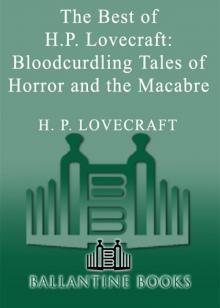 The Best of H.P. Lovecraft
The Best of H.P. Lovecraft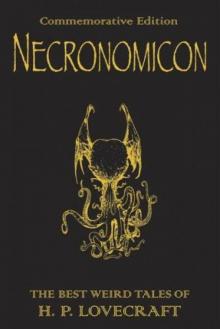 The Definitive H.P. Lovecraft: 67 Tales Of Horror In One Volume
The Definitive H.P. Lovecraft: 67 Tales Of Horror In One Volume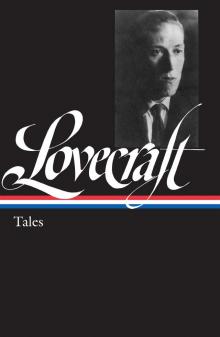 The Complete Works of H.P. Lovecraft
The Complete Works of H.P. Lovecraft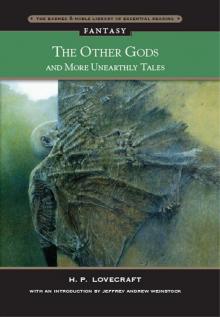 Other Gods and More Unearthly Tales
Other Gods and More Unearthly Tales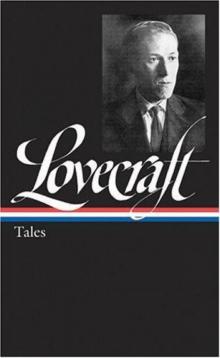 Lovecraft's Fiction Volume I, 1905-1925
Lovecraft's Fiction Volume I, 1905-1925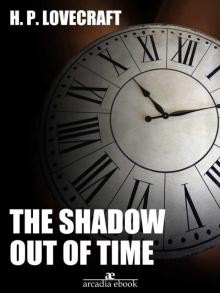 The Shadow Out of Time
The Shadow Out of Time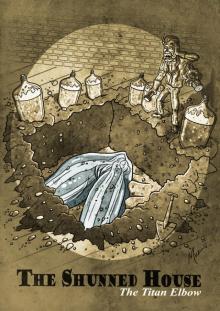 The Shunned House
The Shunned House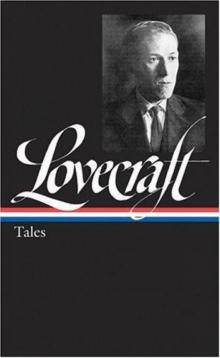 Lovecraft's Fiction Volume II, 1926-1928
Lovecraft's Fiction Volume II, 1926-1928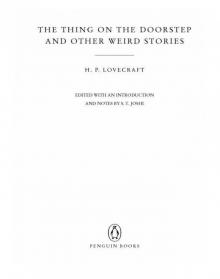 The Thing on the Doorstep and Other Weird Stories
The Thing on the Doorstep and Other Weird Stories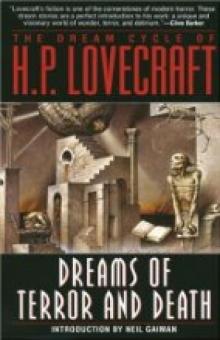 Dream Cycle of H. P. Lovecraft: Dreams of Terror and Death
Dream Cycle of H. P. Lovecraft: Dreams of Terror and Death Great Tales of Horror
Great Tales of Horror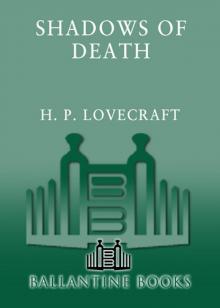 Shadows of Death
Shadows of Death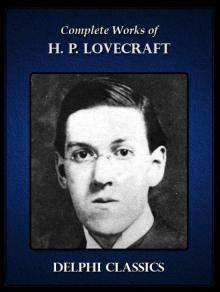 Delphi Complete Works of H. P. Lovecraft (Illustrated)
Delphi Complete Works of H. P. Lovecraft (Illustrated)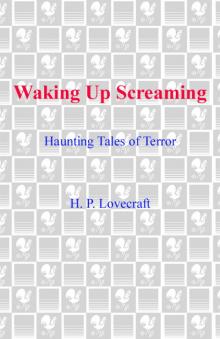 Waking Up Screaming: Haunting Tales of Terror
Waking Up Screaming: Haunting Tales of Terror H.P. Lovecraft Goes to the Movies
H.P. Lovecraft Goes to the Movies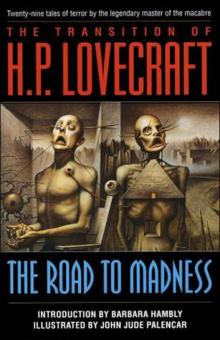 The Road to Madness
The Road to Madness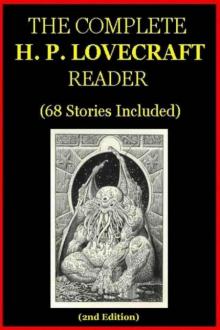 The Complete H.P. Lovecraft Reader (68 Stories)
The Complete H.P. Lovecraft Reader (68 Stories)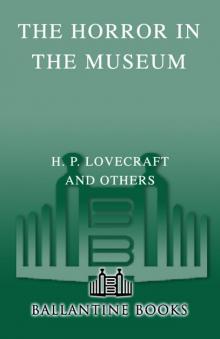 The Horror in the Museum
The Horror in the Museum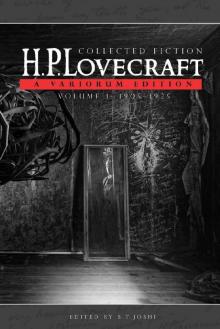 Collected Fiction Volume 1 (1905-1925): A Variorum Edition
Collected Fiction Volume 1 (1905-1925): A Variorum Edition Lovecrafts_Fiction, vol.I_1905-1925
Lovecrafts_Fiction, vol.I_1905-1925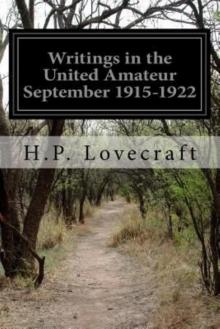 Writings in the United Amateur, 1915-1922
Writings in the United Amateur, 1915-1922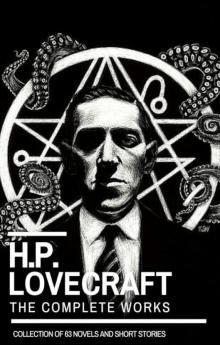 H.P. Lovecraft: The Complete Works
H.P. Lovecraft: The Complete Works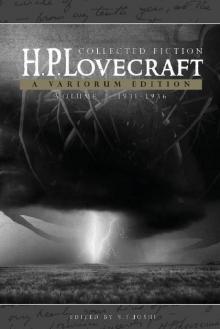 Collected Fiction Volume 3 (1931-1936): A Variorum Edition
Collected Fiction Volume 3 (1931-1936): A Variorum Edition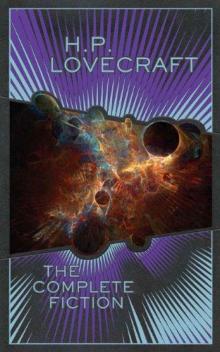 H.P. Lovecraft: The Complete Fiction
H.P. Lovecraft: The Complete Fiction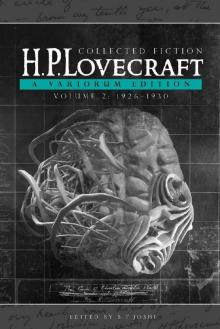 Collected Fiction Volume 2 (1926-1930): A Variorum Edition
Collected Fiction Volume 2 (1926-1930): A Variorum Edition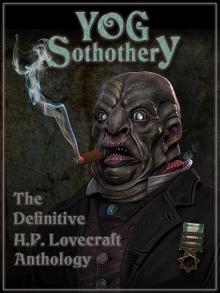 Yog Sothothery - The Definitive H.P. Lovecraft Anthology
Yog Sothothery - The Definitive H.P. Lovecraft Anthology The Complete H.P. Lovecraft Collection (Xist Classics)
The Complete H.P. Lovecraft Collection (Xist Classics)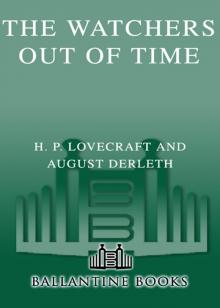 The Watchers Out of Time
The Watchers Out of Time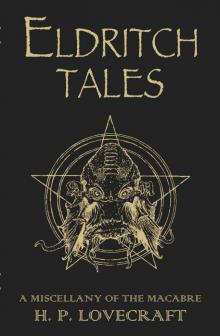 Eldritch Tales
Eldritch Tales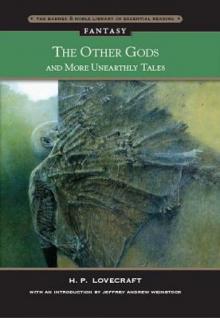 The Other Gods And More Unearthly Tales
The Other Gods And More Unearthly Tales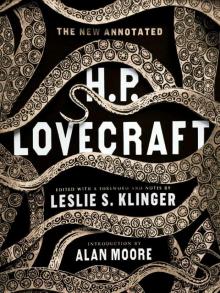 The New Annotated H. P. Lovecraft
The New Annotated H. P. Lovecraft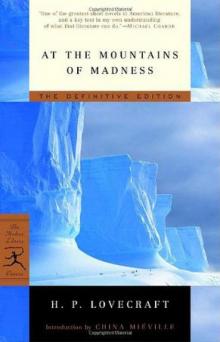 At the mountains of madness
At the mountains of madness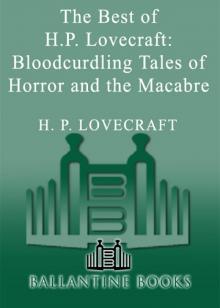 Bloodcurdling Tales of Horror and the Macabre
Bloodcurdling Tales of Horror and the Macabre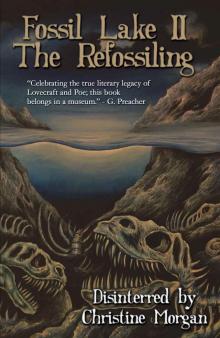 Fossil Lake II: The Refossiling
Fossil Lake II: The Refossiling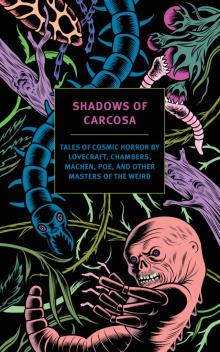 Shadows of Carcosa: Tales of Cosmic Horror by Lovecraft, Chambers, Machen, Poe, and Other Masters of the Weird
Shadows of Carcosa: Tales of Cosmic Horror by Lovecraft, Chambers, Machen, Poe, and Other Masters of the Weird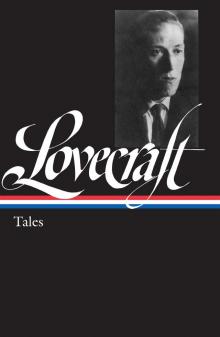 H. P. Lovecraft
H. P. Lovecraft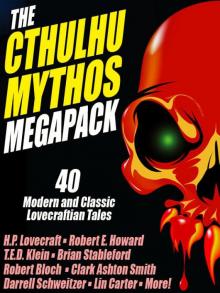 The Cthulhu Mythos Megapack
The Cthulhu Mythos Megapack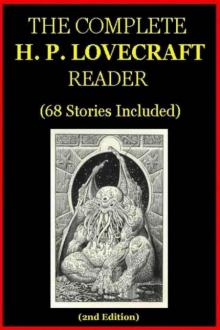 The Complete H. P. Lovecraft Reader (2nd Edition)
The Complete H. P. Lovecraft Reader (2nd Edition)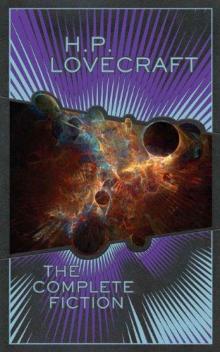 The Complete Fiction
The Complete Fiction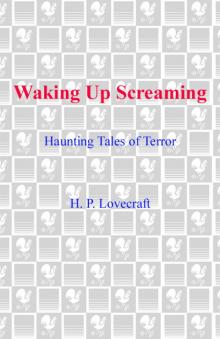 Waking Up Screaming
Waking Up Screaming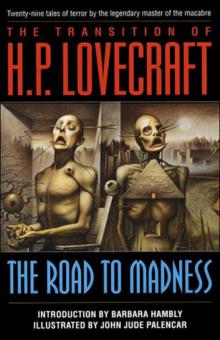 Transition of H. P. Lovecraft
Transition of H. P. Lovecraft![[1935] The Shadow Out of Time Read online](http://i1.bookreadfree.com/i2/04/12/1935_the_shadow_out_of_time_preview.jpg) [1935] The Shadow Out of Time
[1935] The Shadow Out of Time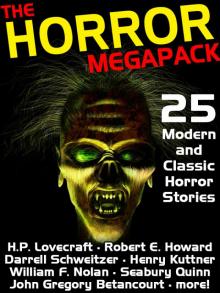 The Horror Megapack
The Horror Megapack